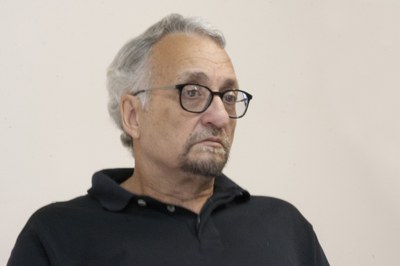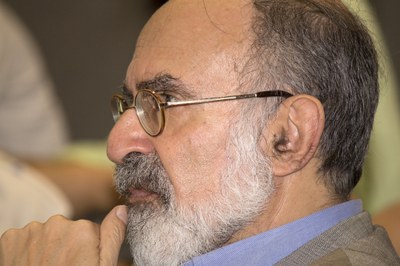Paulo Saldiva and Ary Plonski are appointed director and deputy director of the IEA
The Official State Gazette of São Paulo (Diário Oficial do Estado de São Paulo, in Portuguese) has published the appointment of Paulo Saldiva and Guilherme Ary Plonski for the positions of director and deputy director of the IEA on April 12. They were elected by the Institute's Electoral College on February 18. Of the total of 101 votes, 92 have chosen the winning slate. There have also been six invalid votes and three blank ones. The result has been determined by the Electoral Commission of the Institute and accredited by the Committee for Legislation and Resources (CLR) before being approved by USP's Vice-President Vahan Agopyan.
 |
|---|
| Pathologist Paulo Saldiva, from the USP's School of Medicine (FM) |
Paulo Saldiva, a pathologist and a professor at the Department of Pathology of the USP's School of Medicine (FM), was the deputy director of the IEA until April 2016. He took office in late February last year, replacing Carlos Roberto Ferreira Brandão, from the USP's Museum of Zoology (MZ). His research focuses on pulmonary pathology, environmental pathology and air pollution. He has been a member of the World Health Organization committee that established air quality standards and of the committe of the WHO's International Agency for Research on Cancer, which set the carcinogenic potential of air pollution. From 2004 to 2014, he joined the Science Advisory Committee on air pollution at the Harvard School of Public Health. As director of the IEA, his tenure will last four years.
 |
|---|
| Ary Plonski, a professor at the USP's Faculty of Economics, Management and Accounting (FEA) |
Guilherme Ary Plonski, who will also hold his position for four years, is an engineer and a professor at the Department of Management of the USP's Faculty of Economics, Management and Accounting (FEA), and at the Department of Industrial Engineering of the USP's Polytechnic School (POLI). He was the managing director (2001-2006) of the Institute of Technological Research of the State of São Paulo (IPT) and president of the National Association of Entities Promoting Innovative Enterprises (ANPROTEC). Plonski integrates the Board of Governors of the Israel Institute of Technology (TECHNION). From December 2012 to April this year he was a member of the IEA's Board, leaving his second term in it to take over his new position.
The electoral college has been made up of the following categories:
- current and former members of the IEA's Board;
- the president of the Institute's Research Committee;
- former directors and deputy directors of the IEA;
- directors of faculties and research units at USP, and of their congregations in the University Council.
Proposals
Alongside the continuity of the successfully developed activities, the candidates propose three new guidelines:
- the creation of an Advanced School of Leadership Formation;
- studies on urbanity and quality of life;
- the transformation of the University into a transformative University.
Regarding the first item, Saldiva and Plonski propose that the IEA should shelter people who wish for an "immersion in the full range of variables related to managing complex and important issues for the development of pubic policies, taking advantage of the wealth of knowledge available at USP in all its units."
As for urbanity and quality of life, the professors present the proposal to create a space for dialogue and convergence of all stakeholders in proposing scientific studies and research aimed at improving the living of the inhabitants of metropolitan areas.
With regard to the third item, they propose two actions:
- to make the IEA a reference center that consolidates initiatives aimed at the deep understanding of the processes and prospects for transformation of the University that thrive in the Institute itself or elsewhere at USP;
- to turn the IEA into the link between USP and the legislative branch (Congress, Legislative Assembly of the State of São Paulo and city councils of the municipalities where there is a USP campus), in order to contribute to the improvement of legislation on capital issues such as health, education, generation of employment and income, sanitation, environment, energy, transport, public safety and food security.
